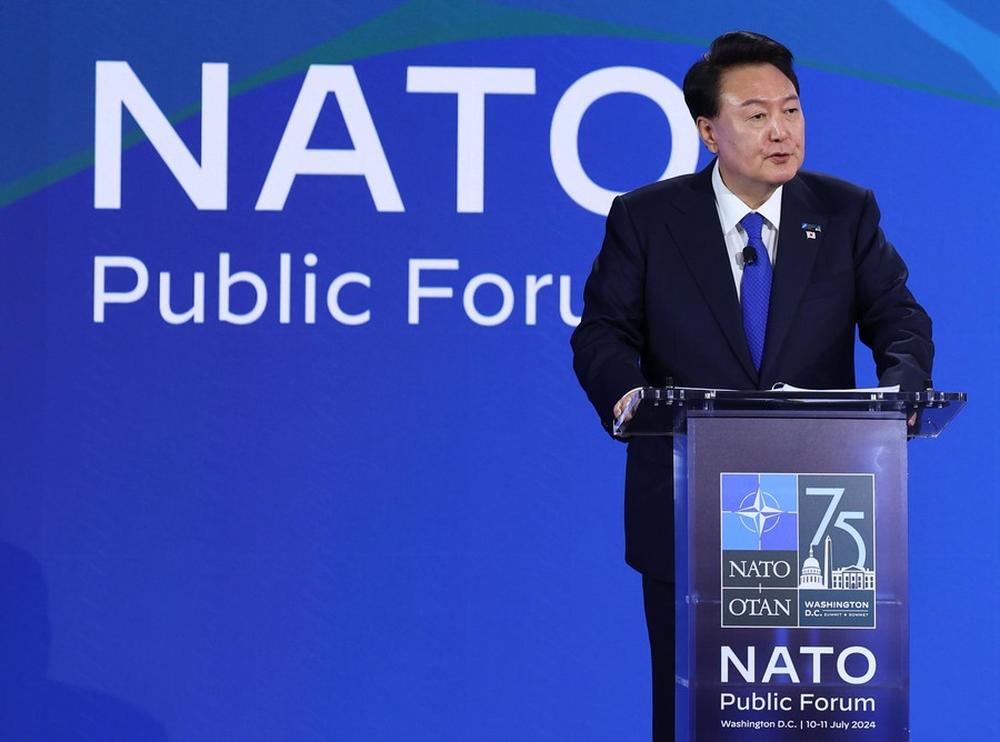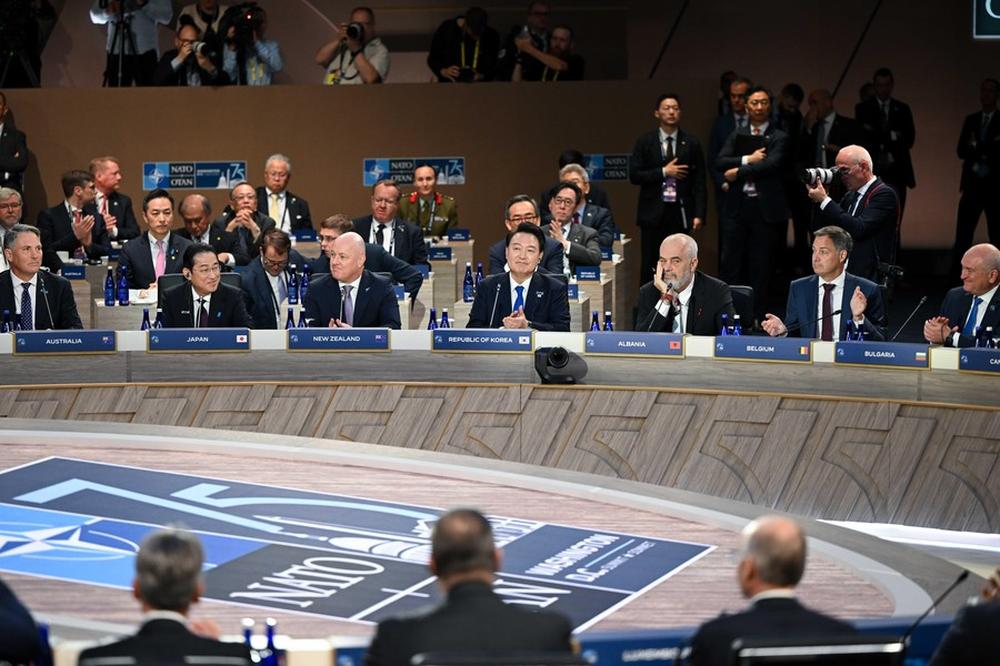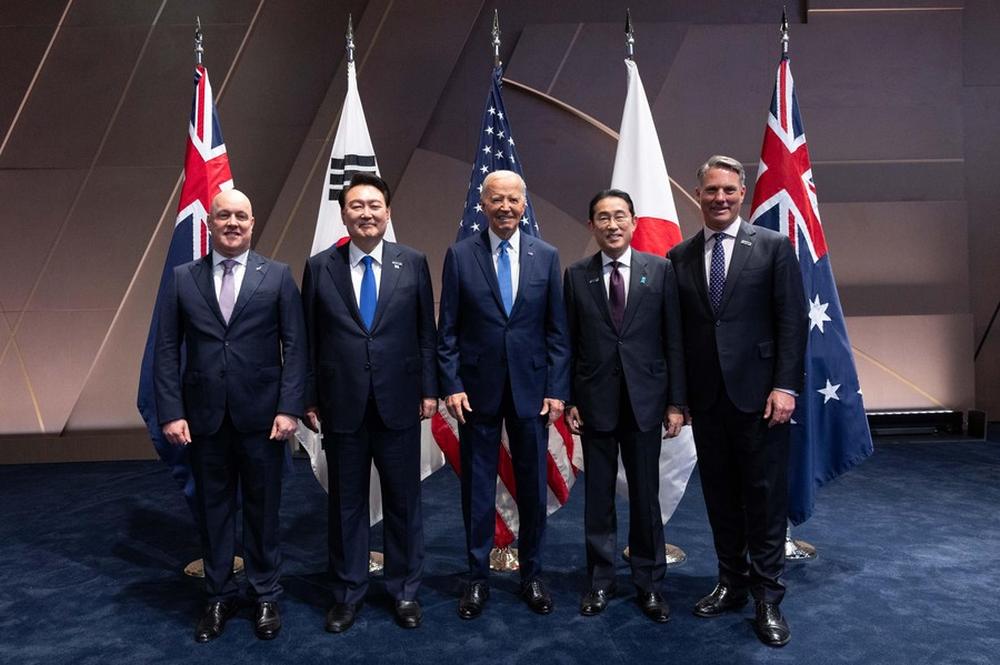- #China-US Competition
- #Global Issues
- #South Korea

► the ROK-NATO Individually Tailored Partnership Programme (ITPP) agreed in July 2023 sets out an ambitious agenda for practical cooperation between the two.
► NATO members like Canada, Germany, Italy, Netherlands, Poland, Spain, and the U.K. are enhancing their presence in the Indo-Pacific through increased cooperation with South Korea and other IP4 countries.
► [the President] Yoon’s efforts during the recent NATO summit to boost nuclear industry sales and cooperation with countries such as the Czech Republic, Netherlands or Sweden benefit from South Korea’s engagement with the organisation, which make Seoul be perceived as a more reliable partner.
What is the purpose of NATO’s cooperation with the IP4 comprised of South Korea, Australia, Japan and New Zealand? What value does South Korea get from its work with NATO? And what will happen when NATO loses interest in cooperation with South Korea and the rest of the IP4?
All of them are very valid questions that policy-makers and experts across both the Transatlantic alliance and the IP4 countries are right to ask themselves. But we should make no mistake: ROK-NATO cooperation is already almost two decades old, formally dating back to 2005. The cooperation has reached new heights in recent years, as a result of strategic developments such as the entrenchment of U.S.-China competition, Russia’s invasion of Ukraine or closer ties between China, North Korea and Russia. And the ROK-NATO Individually Tailored Partnership Programme (ITPP) agreed in July 2023 sets out an ambitious agenda for practical cooperation between the two. It should also be noted that the recent upgrade in South Korea- and IP4-NATO cooperation kick-started during the Trump presidency. In spite of the former U.S. president’s disdain for allies, South Korea and the rest of the IP4 formalised their cooperation with the Brussels-based organisation at the time. Under Biden, NATO-IP4 ties have been further upgraded to the head of government level.
On top of that, South Korea has become an ever more powerful and relevant foreign policy and security actor. NATO, first and foremost, cares about South Korea due to its intrinsic value as a partner. In this sense, the organisation is not different from the many countries and groupings seeking to deepen security and military ties with Seoul. From this follows that the third question above is redundant: South Korea-NATO cooperation is here to stay. Thus, it is more imperative to focus on the first two questions.
The recent Washington, DC, NATO summit was the third in a row to be attended by the President Yoon Suk-yeol along with the other IP4 leaders. The joint declaration coming out of the summit builds on those from recent years, as well as, crucially the Strategic Concept published during the Madrid 2022 summit. And it shows why NATO wants to work together with South Korea. In short, from NATO’s perspective, Asia and the Indo-Pacific on the one hand and the transatlantic region and Europe on the other are part of a single geostrategic domain: what happens in one of them matters for the other.
Russia’s invasion of Ukraine is proof of this. North Korea is sending weapons and munitions to Russia that are being used to kill Ukrainians. China is providing diplomatic backing to Putin’s invasion plus indirect military support with the transfer of dual-use technologies. And were Russia to prevail in its invasion, China could feel emboldened to invade Taiwan, and even North Korea could harbour dreams of launching a strike on South Korea. Even without Russia’s invasion, NATO had already identified China as an strategic opponent, dating back to its London 2019 summit. At the same time, South Korea and Japan are providing non-lethal military equipment and economic support to Ukraine. South Korean firms are also shipping weapons and munitions to Ukraine via third countries. And the IP4 countries plus others such as Taiwan have provided staunch diplomatic backing to Kyiv. More broadly, the economic consequences of Russia’s invasion have been felt globally. As a trade power, South Korea is not immune to them.
Yet, NATO members understand that their influence over strategic and security developments in Asia and the Indo-Pacific is limited. Apart from the U.S., no NATO member has the necessary power projection capabilities to have a permanent presence in the region. Thus, NATO members like Canada, Germany, Italy, Netherlands, Poland, Spain, and the U.K. are enhancing their presence in the Indo-Pacific through increased cooperation with South Korea and other IP4 countries. This includes joint military exercises, cyber exercises, freedom of navigation operations, and information exchanges on non-proliferation and FIMI (Foreign Information Manipulation and Interference). Plus, we are also witnessing deepening cooperation via arms sales and the development of new technologies and weapons systems. These activities will sometimes involve NATO and other times involve NATO members emboldened by their membership of the alliance. From NATO’s perspective, working with South Korea and the rest of the IP4 has many tangible benefits, further reinforcing the point that this is a relationship built to last.
Some policy-makers and experts in South Korea may thus ponder whether their country also benefits from working together with NATO. After all, the ROK-U.S. alliance celebrated its 70th anniversary last year. South Korea has burgeoning bilateral and minilateral security and military ties with the likes of Australia, Canada, France, Japan, Poland or the U.K. outside of NATO, and Seoul should soon be engaging in AUKUS Pillar II — which focuses on the development of new technologies and weapons systems. China and North Korea have made clear their displeasure with NATO-IP4 cooperation, leading to yet another headache in Seoul’s relations with both countries.
Yet, the recent NATO summit hosted by the United States showcased some of the crucial benefits that South Korea accrues from its cooperation with NATO. Starting with the more tangible and practical benefits, in recent years South Korean arms manufacturers have signed deals with a range of NATO members such as Estonia, Finland, Norway, Poland or Romania. Since South Korean arms and weapons systems are compatible with NATO standards and Seoul has been a staunch supporter of Ukraine in its war against Russia, technical and political reasons help explain why NATO members are comfortable acquiring South Korean weapons. Similarly, Yoon’s efforts during the recent NATO summit to boost nuclear industry sales and cooperation with countries such as the Czech Republic, Netherlands or Sweden benefit from South Korea’s engagement with the organisation, which make Seoul be perceived as a more reliable partner.
When it comes to South Korea’s core security interests, cooperation with NATO supports Seoul’s non-proliferation work against North Korea via deployment by some of its members and information sharing; cybersecurity capabilities via joint exercises and information sharing; or maritime security efforts in the East and South China seas through freedom of navigation exercises by individual members. There are reasons why the ROK Armed Forces and Ministry of National Defense have been quietly focusing on cooperation with NATO for many years: there are tangible security and military benefits for their country coming out of this cooperation.
More generally and at a politico-diplomatic level, South Korea is a full democracy supportive of liberal values in a region in which both are uncommon. Cooperation with NATO serves South Korea’s long-standing push to have a foreign and security policy that prioritises its own interests, but is also informed by its post-1987 values. This is no small benefit at a time when the UN is paralysed, and authoritarian regimes including China, North Korea and Russia are challenging liberal values.
Since South Korea-NATO cooperation won’t go away any time soon, no matter who wins the upcoming U.S. election or who is in office in South Korea once Yoon’s non-renewable mandate is over, Seoul ought to focus on the reasons why its partnership with the organisation benefits both sides. In this respect, South Korea and the rest of the IP4 accrue both tangible and diplomatic benefits from working with NATO. These override any negative impact that cooperation with the organisation may have.
Ramon Pacheco Pardo is Professor of International Relations at King’s College London and the KF-VUB Korea Chair at the Brussels School of Governance.

